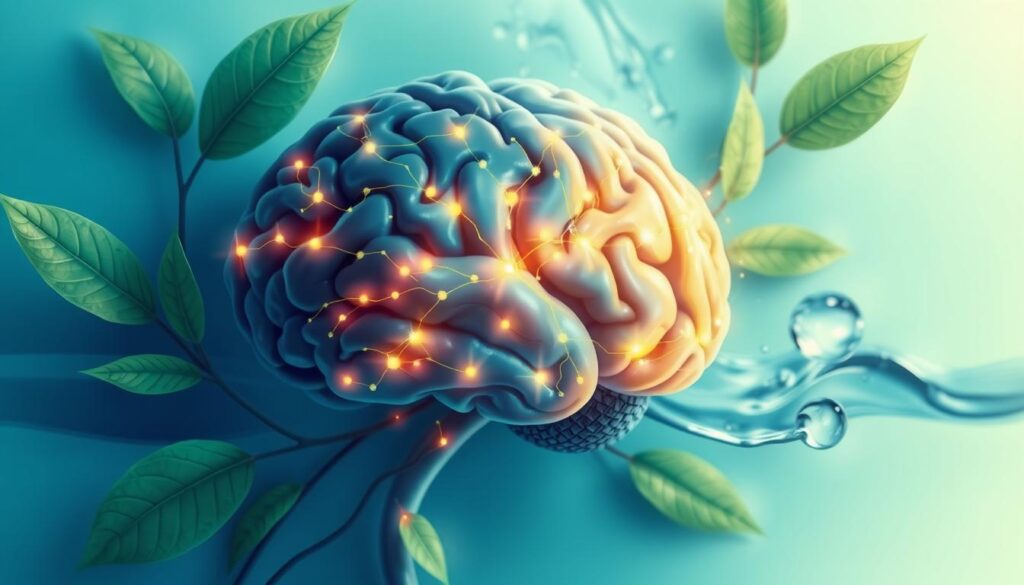Mental clarity is key for our thinking and feeling well. It helps us deal with life’s ups and downs. A clear mind is good for managing stress, building strong relationships, and achieving our goals.
To get better mental clarity, we can try different methods. These include changing our lifestyle, practicing mindfulness, and doing brain exercises. These steps can help us stay sharp and focused.
Key Takeaways
- Mental clarity is crucial for cognitive function and overall well-being.
- Improving mental clarity can enhance stress management, relationships, productivity, and personal growth.
- Effective strategies for improving mental clarity include lifestyle changes, mindfulness practices, and cognitive exercises.
- Incorporating these strategies can help individuals achieve a clearer, more focused, and resilient mindset.
- Prioritizing mental clarity can lead to improved decision-making, problem-solving, and overall quality of life.
Understanding Mental Clarity and Its Importance
Mental clarity means being focused and able to understand thoughts clearly. It’s key for our daily lives and how productive we are. But, many face brain fog and lack of mental sharpness, making it hard to do well in life.
Defining Mental Clarity and Cognitive Function
Mental clarity is about thinking clearly and making good choices. It’s linked to our brain’s ability to learn, solve problems, and decide. When our brain isn’t working well, we struggle to focus, remember things, and stay sharp.
Signs of Poor Mental Clarity
- Inability to focus or concentrate
- Physical or mental exhaustion after simple tasks
- Loss of interest in previously enjoyable activities
- Memory problems and difficulty recalling information
Impact on Daily Life and Productivity
Lack of mental clarity affects many parts of our lives. It can hurt our work, relationships, self-esteem, and sleep. People with poor cognitive performance find it hard to do tasks, make smart choices, and balance work and life. This can cause more stress, lower productivity, and harm our overall health.
“Not getting enough restorative shut-eye can leave you with dulled cognitive abilities equivalent to that of someone with a blood alcohol concentration of 0.1% above the legal limit for driving in most U.S. states.”
The Science Behind Mental Performance and Brain Health

Keeping our brains working well is key to handling daily life. Research in neuroscience has uncovered how brain health and mental performance are connected. It shows us what affects this relationship.
Brain function and cognitive efficiency are tied to lifestyle choices like sleep, exercise, diet, and managing stress. Getting enough sleep is vital for our brains. Lack of sleep can hurt our memory, focus, and how quickly we process information. Exercise boosts blood flow to the brain, helps grow new brain cells, and increases BDNF, which is good for brain health and thinking skills.
What we eat also matters a lot for our brain. Eating foods that fight inflammation, like omega-3s, antioxidants, and complex carbs, can clear brain fog and protect the brain. But, eating too much processed food, sugar, and unhealthy fats can harm our brain and thinking abilities.
Managing stress is also important for our brain. Too much stress can harm the brain, causing inflammation, less brain flexibility, and poor thinking skills. Doing things like meditation, yoga, or deep breathing can help reduce stress’s negative effects on the brain and improve our mental health.
By learning about mental performance and brain health, we can take steps to support our brain. This includes getting enough sleep, staying active, eating right, and managing stress. These actions can help us reach our mental potential.
Essential Lifestyle Changes for Improving Mental Clarity
Getting your mind clear and sharp is key in today’s fast-paced world. Making a few simple changes in your lifestyle can really help. Let’s look at three important areas: getting enough sleep, staying active, and eating right.
Sleep Optimization Techniques
Good sleep is vital for a clear mind. Sadly, many adults don’t get enough sleep. By sticking to a sleep schedule and following sleep hygiene tips, you can boost your focus and decision-making skills.
Physical Exercise and Brain Function
Exercise is a great way to improve your brain. Experts say we should do at least 30 minutes of moderate activity daily. Activities like yoga and aerobic exercises can make your brain work better.
Nutrition and Dietary Considerations
Eating well is crucial for your brain. Eating foods that fight inflammation, like fruits and whole grains, helps your brain stay sharp. Drinking enough water and eating mindfully can also keep your mind clear.
By making these lifestyle changes, you can unlock your mind’s full potential. You’ll feel more focused, productive, and happy.
| Lifestyle Factor | Impact on Mental Clarity | Recommended Practices |
|---|---|---|
| Sleep Hygiene | Improved concentration, cognitive function, and decision-making |
|
| Physical Activity | Enhanced brain function, improved mood, and increased energy levels |
|
| Healthy Eating | Optimized brain health, reduced inflammation, and improved cognitive performance |
|
“A well-nourished brain is the foundation for mental clarity and cognitive resilience.”
Mindfulness and Meditation Practices

Mindfulness and meditation are great for your mind and body. They help you focus better and feel less stressed. These old practices are now known for boosting your mood and brain power.
Mindfulness meditation is a favorite among many. It’s about finding a quiet spot, sitting comfortably, and focusing on now. You might watch your breath or feel your body. Studies show it helps with stress, anxiety, and sadness.
Transcendental meditation is another favorite. You silently repeat a special word to relax deeply and become more aware. It’s good for your brain, emotions, and stress levels.
Guided imagery meditation is also popular. It’s when someone guides you through a relaxing picture in your mind. It’s great for pain, sleep, and creativity.
- More than 200 studies have looked at mindfulness in healthy people. They found it’s good for stress, anxiety, and depression.
- Mindfulness has shown promise in treating depression, pain, smoking, and addiction.
- Studies say mindfulness, like Mindfulness-Based Cognitive Therapy (MBCT), helps prevent depression from coming back.
| Meditation Technique | Benefits |
|---|---|
| Mindfulness Meditation | Stress management, improved focus, emotional well-being |
| Transcendental Meditation | Increased cognitive function, emotional resilience, reduced stress |
| Guided Imagery Meditation | Relaxation, pain management, enhanced creativity |
Adding mindfulness and meditation to your day can change your life. It’s not just about sitting still. It’s about taking a moment to breathe and focus. These practices can help you handle stress, improve your concentration, and reach your full potential.
Managing Stress and Emotional Well-being

Keeping your mind clear is linked to managing stress and taking care of your emotional health. Using different ways to reduce stress and growing emotionally strong are key steps.
Stress Reduction Techniques
Adding relaxation practices to your daily life can really help with stress. Methods like progressive muscle relaxation, biofeedback, and deep breathing can soothe your mind and body. Mindfulness meditation and a regular gratitude practice also help balance your emotions.
Building Emotional Resilience
It’s important to learn how to handle life’s ups and downs to build emotional strength. This means having good friends, taking care of yourself, and getting help when you need it. Showing gratitude and reflecting on your feelings can also boost your emotional health.
Work-Life Balance Strategies
Having a good balance between work and personal life is key to avoiding burnout and keeping your mental health strong. Getting enough sleep, exercising regularly, and eating well helps with emotional control. Setting clear boundaries, learning to delegate, and saying “no” when needed can also help you feel in control and well.
| Statistic | Value |
|---|---|
| Adults need 7 or more hours of sleep per night for optimal emotional well-being | 7 hours |
| Recommended physical activity for emotional well-being | 2 ½ hours per week |
| Ideal alcohol intake for emotional well-being | 1 drink or less per day for women, 2 drinks or less per day for men |
By using good stress management, growing emotionally strong, and keeping a healthy work-life balance, you can improve your mental clarity and overall well-being.
Brain-Boosting Activities and Cognitive Exercises

Doing brain-boosting activities and cognitive exercises can really help your mind. They make your brain work harder, strengthen connections, and improve your thinking skills over time.
Reading books, solving puzzles, learning new things, and practicing mindfulness are great ways to keep your mind sharp. Adding these activities to your daily life can greatly improve your mental performance and happiness.
Puzzles and Problem-Solving
Trying out puzzles like crosswords, jigsaw puzzles, and Sudoku can really challenge your brain. Studies show that doing these puzzles regularly can boost your memory, problem-solving, and how you process information.
Learning New Skills
Learning something new, like playing a musical instrument, learning a language, or a new hobby, is also good for your brain. It makes different parts of your brain work together, improving your memory, focus, and ability to adapt.
Social Interaction and Mental Stimulation
Staying socially active and doing mentally stimulating activities, like playing board games, card games, or joining group discussions, also helps your brain. Research shows that staying socially connected and doing mentally challenging activities can slow down brain aging and dementia.
| Activity | Cognitive Benefits |
|---|---|
| Crossword Puzzles | Improved vocabulary, memory, and problem-solving skills |
| Jigsaw Puzzles | Enhanced visuospatial abilities and cognitive function |
| Sudoku | Strengthened problem-solving, logical reasoning, and concentration |
| Learning a Musical Instrument | Improved memory, attention, and information processing speed |
| Learning a New Language | Enhanced cognitive flexibility, memory, and executive function |
| Playing Chess or Strategy Games | Improved memory, problem-solving, and information processing |
By regularly doing these activities, you can unlock your brain’s full potential. Keeping your mind sharp and focused is possible with consistent practice and a love for learning. This commitment supports your cognitive health and well-being.
Also Read: Mental Health Tips For Teenagers
Conclusion
Improving mental clarity is a journey that needs a whole-body approach. It involves making lifestyle changes, practicing mindfulness, managing stress, and doing brain exercises. Studies have found that good sleep, exercise, healthy food, and meditation help a lot.
Doing memory games, reading, and focusing on one thing at a time also boosts your brain. Sometimes, you might need professional help for mental health issues. By using these proven methods, you can reach your full potential and live better.
The way to better mental clarity is through self-care and being mindful. By using these strategies, you can make your brain healthier and your life more rewarding.
FAQs
Q: What is brain fog and what causes it?
A: Brain fog is a term used to describe a state of mental confusion, lack of clarity, and sluggishness. Common causes include lack of sleep, poor nutrition, chronic stress, and underlying health conditions that can impact brain function.
Q: How can I improve my mental clarity?
A: To improve your mental clarity, prioritize quality sleep, maintain a balanced diet rich in fatty acids, reduce stress through mindfulness practices, and limit multitasking to enhance focus and cognitive function.
Q: What role does sleep hygiene play in mental clarity?
A: Good sleep hygiene helps improve mental clarity by ensuring you get enough hours of sleep and quality rest. Poor sleep can lead to mental fatigue and contribute to experiencing brain fog throughout the day.
Q: How does poor nutrition affect brain health?
A: Poor nutrition can lead to a lack of essential nutrients that support brain function, which may contribute to mental fatigue and a lack of mental clarity. Eating a well-balanced diet can help alleviate brain fog and improve concentration.
Q: Can stress contribute to experiencing mental fog?
A: Yes, chronic stress can significantly impact cognitive function and contribute to brain fog. Implementing stress-reducing techniques such as mindfulness and regular exercise can help improve your mental clarity.
Q: What are some specific strategies to help improve mental clarity?
A: Strategies to help improve mental clarity include practicing mindfulness, ensuring sufficient hours of sleep, staying hydrated, engaging in regular physical activity, and taking breaks to avoid mental overload.
Q: Is forgetfulness a sign of a lack of mental clarity?
A: Yes, forgetfulness can be a symptom of experiencing a lack of mental clarity. Improving concentration and reducing distractions can help enhance mental sharpness and alleviate brain fog.
Q: How can I tell if I have underlying health conditions affecting my brain function?
A: If you are struggling with mental clarity, experiencing mental fog frequently, or noticing changes in your cognitive function, it may be wise to consult a healthcare professional. They can help identify possible underlying health conditions that may be affecting your brain health.
Q: What lifestyle changes can help alleviate brain fog?
A: Lifestyle changes such as improving sleep hygiene, eating a nutrient-rich diet, managing stress effectively, and incorporating regular physical activity can help alleviate brain fog and improve mental clarity.
Source Links
- https://www.everydayhealth.com/emotional-health/tips-to-beat-brain-fog-foster-focus-and-improve-mental-clarity/
- https://medlineplus.gov/howtoimprovementalhealth.html
- https://www.starlingminds.com/brain-fog-causes-impacts-and-strategies-to-improve-mental-clarity/
- https://elevateapp.com/blog/understanding-mental-clarity
- https://www.betterup.com/blog/mental-clarity
- https://www.michelelian.com/blog/mental-clarity/
- https://www.apa.org/monitor/2024/01/trends-brain-health-aging
- https://pmc.ncbi.nlm.nih.gov/articles/PMC6770965/
- https://www.psychiatry.org/patients-families/lifestyle-to-support-mental-health
- https://www.westernsydney.edu.au/nicmhri/news/five_lifestyle_changes_to_enhance_your_mood_and_mental_health
- https://www.nhs.uk/mental-health/self-help/guides-tools-and-activities/five-steps-to-mental-wellbeing/
- https://www.apa.org/topics/mindfulness/meditation
- https://balanceapp.com/blog/meditation-for-clarity
- https://www.cdc.gov/emotional-well-being/improve-your-emotional-well-being/index.html
- https://www.mentalhealth.org.uk/explore-mental-health/publications/how-manage-and-reduce-stress
- https://www.cdc.gov/mental-health/living-with/index.html
- https://www.medicalnewstoday.com/articles/brain-exercises
- https://www.healthline.com/health/mental-health/brain-exercises
- https://psychcentral.com/health/brain-exercises
- https://www.ncbi.nlm.nih.gov/books/NBK541484/
- https://www.apa.org/monitor/2012/07-08/ce-corner
- https://www.healthline.com/health/depression/mental-fitness




